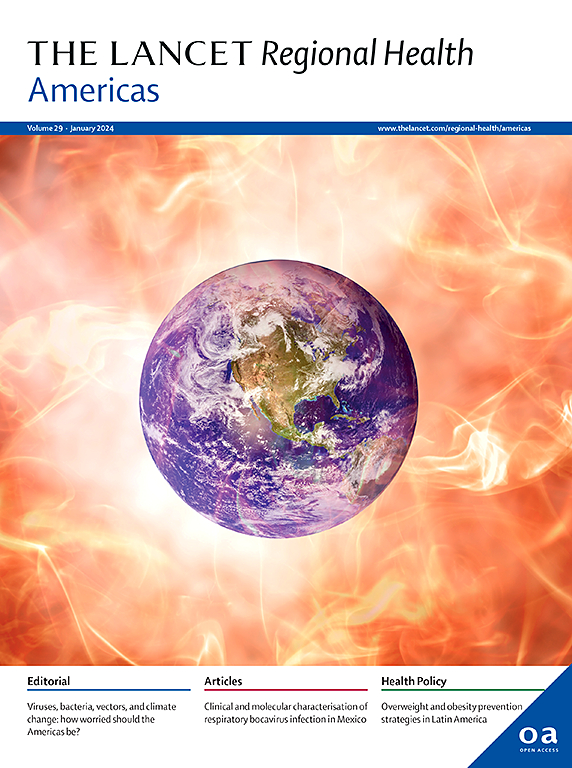年轻海军陆战队员 SARS-CoV-2 后遗症的临床和功能评估 - 小组研究
IF 7
Q1 HEALTH CARE SCIENCES & SERVICES
引用次数: 0
摘要
背景SARS-CoV-2对健康造成的长期不利影响令人深感忧虑,尤其是在可能造成最大长期发病率的年轻成年人中。我们试图对海军陆战队队列中的这些结果进行评估和描述。方法我们使用了以前对急性 SARS-CoV-2 进行的纵向前瞻性观察研究中的美国海军陆战队队列,其中大多数人是在感染之前加入的。为了评估 COVID-19 急性后遗症 (PASC),我们开展了一项小组研究,PASC 的定义是症状出现或确诊后至少 4 周出现的症状。症状通过调查问卷和经过验证的健康质量指标进行评估。定期进行的美国海军陆战队体能测试指标提供了额外的标准化功能评估,并与疫情发生前的队列进行了比较。研究结果全球分散的海军陆战队参与者(n = 899)在首次注册后平均 330 天就诊,他们主要为男性(n = 825,91.7%)、白人(n = 613,71.6%)或黑人(n = 149,17.4%),中位年龄为 18 岁(四分位间范围:18-19)。在 798 名感染 SARS-CoV-2 的参与者中,197 人(24.7%)出现 PASC。最常见的症状是味觉和/或嗅觉丧失(82 人;41.6%)、呼吸急促(74 人;37.6%)和咳嗽(45 人;22.8%)。PASC 患者的躯体症状(p < 0.0001)、一般抑郁症状(p < 0.0001)和焦虑症状(p = 0.005)的发生率和严重程度都较高。与历史上的海军陆战队队列相比,患有 PASC 的参与者在体能评估中得分较低,因为跑步时间较慢(p = 0.002)。在这群健康的年轻成年美国海军陆战队员中,大部分人都患有无症状或轻度急性 COVID-19,其中四分之一的人报告了身体、认知或精神方面的长期感染后遗症。感染 PASC 的海军陆战队员显示出功能表现长期下降的证据,这表明 SARS-CoV-2 感染可能会对相当一部分年轻人的健康产生负面影响。本文章由计算机程序翻译,如有差异,请以英文原文为准。
Clinical and functional assessment of SARS-CoV-2 sequelae among young marines – a panel study
Background
Long-term SARS-CoV-2 adverse health outcomes are of significant concern, especially among young adults with the potential for the greatest long-term morbidity. We sought to assess and characterize these outcomes in a cohort of Marines.
Methods
We used a cohort of US Marines from a previous longitudinal, prospective observational study of acute SARS-CoV-2, most of whom were enrolled prior to infection. A panel study was established to assess for post-acute sequelae of COVID-19 (PASC), defined as symptoms at least 4 weeks after symptom onset or diagnosis. Symptoms were assessed through questionnaires and validated quality of health metrics. Periodic US Marine Corps fitness testing metrics provided an additional standardized functional assessment and were compared to a pre-pandemic cohort.
Findings
Globally dispersed Marine participants (n = 899) seen an average of 330 days following initial enrollment were predominately male (n = 825, 91.7%), White (n = 613, 71.6%) or Black (n = 149, 17.4%) with a median age of 18 years (interquartile range: 18–19). Among 798 SARS-CoV-2 infected participants, 197 (24.7%) developed PASC. The most prevalent symptoms were loss of taste and/or smell (n = 82; 41.6%), shortness of breath (n = 74; 37.6%), and cough (n = 45; 22.8%). Those with PASC had higher rates and severity of somatic (p < 0.0001), general depressive (p < 0.0001), and anxiety (p = 0.005) symptoms. Compared to a historic cohort of Marines, participants with PASC scored worse on their physical fitness assessments due to slower run times (p = 0.002). Those with PASC continued to have decreased physical performance one year after completing initial training.
Interpretation
In this population of healthy young adult US Marines with mostly either asymptomatic or mild acute COVID-19, one fourth reported physical, cognitive, or psychiatric long-term sequelae of infection. The Marines affected with PASC showed evidence of long-term decrease in functional performance suggesting that SARS-CoV-2 infection may negatively affect health for a significant proportion of young adults.
Funding
Defense Health Agency and Defense Advanced Research Projects Agency.
求助全文
通过发布文献求助,成功后即可免费获取论文全文。
去求助
来源期刊

Lancet Regional Health-Americas
Multiple-
CiteScore
8.00
自引率
0.00%
发文量
0
期刊介绍:
The Lancet Regional Health – Americas, an open-access journal, contributes to The Lancet's global initiative by focusing on health-care quality and access in the Americas. It aims to advance clinical practice and health policy in the region, promoting better health outcomes. The journal publishes high-quality original research advocating change or shedding light on clinical practice and health policy. It welcomes submissions on various regional health topics, including infectious diseases, non-communicable diseases, child and adolescent health, maternal and reproductive health, emergency care, health policy, and health equity.
 求助内容:
求助内容: 应助结果提醒方式:
应助结果提醒方式:


